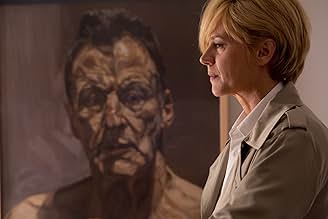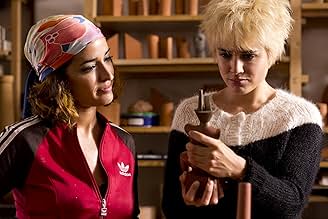VALUTAZIONE IMDb
7,1/10
34.912
LA TUA VALUTAZIONE
Dopo un incontro casuale, una donna dal cuore spezzato decide di affrontare la sua vita e gli eventi più importanti che riguardano la figlia.Dopo un incontro casuale, una donna dal cuore spezzato decide di affrontare la sua vita e gli eventi più importanti che riguardano la figlia.Dopo un incontro casuale, una donna dal cuore spezzato decide di affrontare la sua vita e gli eventi più importanti che riguardano la figlia.
- Nominato ai 1 BAFTA Award
- 14 vittorie e 62 candidature totali
Darío Grandinetti
- Lorenzo
- (as Dario Grandinetti)
Ramón Agirre
- Inocencio - portero
- (as Ramón Aguirre)
Recensioni in evidenza
The screenplay of 'Julieta' is constructed with almost mathematical precision. In one of the first scenes, director Almodovar presents the question that is central to the rest of the film: what happened to the daughter of lead character Julieta? Most of the film consists of a long flashback, in which he slowly reveals the circumstances and events that led to her disappearance. At the end of the film, we are back in the present again, and we know everything there is to know.
It's a story Hitchcock would have been proud of: there is suspense, a beautiful blonde femme fatale, and psychological story elements. Not only the story, but also the cinematography is reminiscent of the master of suspense. Every scene is shot with extreme attention to lighting, colour and camera angle. Small details are the cherry on the cake: notice the way Almodovar introduces the birthday cake for the disappeared daughter: shot from above, as if it is a surreal work of art. Another example is the short sex scene in the train: the viewer sees only Julieta's head, but the rest of her body is reflected in the window pane behind her. As a director, Almodovar wants as much to be in control as Hitch. The result is a very beautiful film in every way - even the soundtrack is extremely tasteful.
'Julieta' is an elegantly filmed drama. There are no outrageous characters, exuberant scenes or other colourful elements we know from his earlier films. This is a restrained, precise and in every way immaculate piece of cinema.
It's a story Hitchcock would have been proud of: there is suspense, a beautiful blonde femme fatale, and psychological story elements. Not only the story, but also the cinematography is reminiscent of the master of suspense. Every scene is shot with extreme attention to lighting, colour and camera angle. Small details are the cherry on the cake: notice the way Almodovar introduces the birthday cake for the disappeared daughter: shot from above, as if it is a surreal work of art. Another example is the short sex scene in the train: the viewer sees only Julieta's head, but the rest of her body is reflected in the window pane behind her. As a director, Almodovar wants as much to be in control as Hitch. The result is a very beautiful film in every way - even the soundtrack is extremely tasteful.
'Julieta' is an elegantly filmed drama. There are no outrageous characters, exuberant scenes or other colourful elements we know from his earlier films. This is a restrained, precise and in every way immaculate piece of cinema.
Not Almodovar's best film, but also far from his weakest. This character study/mystery/melodrama has hints of both Douglas Sirk and even Hitchcock in its beautiful look, production design, and score, even if it's story is more wispy than most films by those old masters.
Julieta is a classy, attractive middle-aged woman, living seemingly happily with a successful writer, when she encounters an old friend of her daughter's. The friend tells Julieta of running into the girl while traveling – not knowing the daughter disappeared many years ago, a loss that left Julieta emotionally destroyed.
Julieta abruptly decides to break up with her current man, and live alone to try and deal with the re-awakened grief she had finally managed to tamp down. She writes the story of her adult life and loves – which led to her loss – as a sort of goodbye (perhaps suicide?) letter/diary to her daughter that she knows will probably never be read.
The story is always interesting, and the performances are generally quite strong (with one glaring exception in Rossy De Palma's over the top villain-y maid, who seems like she's stepped out one of Almodovar's far less subtle, more campy stories). But while the characters are going through tempests of great emotion, the film kept me cool, removed and observational. That's no crime, but it did keep it from being a powerful experience -- it ended up being an 'interesting and stylish' one instead. Almodovar has said he intended the film to be seen twice, so one can re-see the scenes understanding the film's later revelations, and as admire his work I'm willing to give it that chance and see if that deepens the experience.
Julieta is a classy, attractive middle-aged woman, living seemingly happily with a successful writer, when she encounters an old friend of her daughter's. The friend tells Julieta of running into the girl while traveling – not knowing the daughter disappeared many years ago, a loss that left Julieta emotionally destroyed.
Julieta abruptly decides to break up with her current man, and live alone to try and deal with the re-awakened grief she had finally managed to tamp down. She writes the story of her adult life and loves – which led to her loss – as a sort of goodbye (perhaps suicide?) letter/diary to her daughter that she knows will probably never be read.
The story is always interesting, and the performances are generally quite strong (with one glaring exception in Rossy De Palma's over the top villain-y maid, who seems like she's stepped out one of Almodovar's far less subtle, more campy stories). But while the characters are going through tempests of great emotion, the film kept me cool, removed and observational. That's no crime, but it did keep it from being a powerful experience -- it ended up being an 'interesting and stylish' one instead. Almodovar has said he intended the film to be seen twice, so one can re-see the scenes understanding the film's later revelations, and as admire his work I'm willing to give it that chance and see if that deepens the experience.
It's usually worth watching an Almodovar movie if only for the exquisite use he makes of the camera and the quality of acting he manages to extract from his cast. That is certainly the case with Julieta in which every scene is beautifully composed. Andalusia, Galicia and Madrid have never looked so enticing. Having said that, the narrative of this movie is really poor. It revolves in some sense around the theme of guilt but that doesn't stand up well to a close examination. The twist at the close is pure melodrama and the film doesn't really end at all. Almodovar just brings down the shutters on the movie. So this is very much a mixed bag. Lovely filming, lovely actors, lovely decor, but dare I say it, this is basically an art-house soap.
I found Julieta to be interesting at the very least. The story has a smooth flow and My whole attention was within the movie. I was trying to grasp everything the characters said while enjoying the visuals and the score.
Technically, this is probably Almadovar's best work. The scenery and camera work is beautiful. The colors please the eye. The score in the background is always in the right tone. Aiding to the smooth transitions within the movie. The cast is excellent. I understood clearly who each character is.
The main theme of Julieta is the relationship between a mother and her child. And that some things we understand as we grow older, with our life experience. This is a recurring theme in Almadovar's movies ('High Heels', 'Volver') but it is set upon a different set of characters with different virtues and faults. And of course a different story.
The plot is imperfect but it is very interesting nonetheless. I didn't fall in love with the characters of Julieta like it was in 'All about my mother' - and this is the main reason I didn't rate it higher - but I still felt their human side. And on the upside, there were no annoying or boring characters either.
People write about a new Almadovar. Well, for me it was a bit of misleading. I saw the director's signature elements through the whole movie. I'm talking about the camera shots, the low amount of people on set, the gradual revelation of events so when the credits roll the viewer knows all that happened explaining all the references made. It is less extravagant then some of his other work, but it is definitely not his first in being such.
Technically, this is probably Almadovar's best work. The scenery and camera work is beautiful. The colors please the eye. The score in the background is always in the right tone. Aiding to the smooth transitions within the movie. The cast is excellent. I understood clearly who each character is.
The main theme of Julieta is the relationship between a mother and her child. And that some things we understand as we grow older, with our life experience. This is a recurring theme in Almadovar's movies ('High Heels', 'Volver') but it is set upon a different set of characters with different virtues and faults. And of course a different story.
The plot is imperfect but it is very interesting nonetheless. I didn't fall in love with the characters of Julieta like it was in 'All about my mother' - and this is the main reason I didn't rate it higher - but I still felt their human side. And on the upside, there were no annoying or boring characters either.
People write about a new Almadovar. Well, for me it was a bit of misleading. I saw the director's signature elements through the whole movie. I'm talking about the camera shots, the low amount of people on set, the gradual revelation of events so when the credits roll the viewer knows all that happened explaining all the references made. It is less extravagant then some of his other work, but it is definitely not his first in being such.
In Madrid, the middle-aged Julieta (Emma Suárez) is packing her books to move to Portugal with her boyfriend Lorenzo (Dario Grandinetti). She goes shopping for the journey and stumbles upon Bea (Michelle Jenner), who was the best friend of her missing daughter Antia. They talk to each other and Bea discloses that Antia is married with three children. Julieta decides to stay in Madrid; breaks with Lorenzo; and rents an apartment in her former building, hoping that Antia contacts her. She decides to write the heartbreaking story of her life since she was a young woman and met her beloved future husband and Antia´s father Xoan (Daniel Grao) until the losses of Xoan and Antia.
"Julieta" is a dramatic romance by Pedro Almodóvar in a conventional style totally different from most of his previous works, since it is neither tacky nor aggressive to the Catholic Church; and using neither bright colors nor bizarre characters. Indeed it is a mature work disclosing the story of a middle-aged depressed woman that has her life affected for the loss of her beloved husband first and the last twelve years for the disappearance of her eighteen year-old daughter. The most important, the powerful drama never becomes a melodramatic soap-opera. The screenplay is very well-written with a perfect open end and magnificent cast. My vote is seven.
Title (Brazil): "Julieta"
"Julieta" is a dramatic romance by Pedro Almodóvar in a conventional style totally different from most of his previous works, since it is neither tacky nor aggressive to the Catholic Church; and using neither bright colors nor bizarre characters. Indeed it is a mature work disclosing the story of a middle-aged depressed woman that has her life affected for the loss of her beloved husband first and the last twelve years for the disappearance of her eighteen year-old daughter. The most important, the powerful drama never becomes a melodramatic soap-opera. The screenplay is very well-written with a perfect open end and magnificent cast. My vote is seven.
Title (Brazil): "Julieta"
Lo sapevi?
- QuizAll the sculptures made by Ava are in reality made by Miquel Navarro, a well known artist from Spain.
- BlooperWhen the train does an emergency brake and luggage and people are being tossed all over the place a coffee cup and coffee pot in front of the main character remains undisturbed.
- ConnessioniFeatured in Fandor: The High Art of Pedro Almodóvar's Camp (2018)
- Colonne sonorePlaying the Piano 2009
Written and Performed by Ryuichi Sakamoto
I più visti
Accedi per valutare e creare un elenco di titoli salvati per ottenere consigli personalizzati
- How long is Julieta?Powered by Alexa
- What are the three Ancient Greek words for the sea?
Dettagli
- Data di uscita
- Paesi di origine
- Siti ufficiali
- Lingua
- Celebre anche come
- Джульєтта
- Luoghi delle riprese
- Redes, A Coruña, Spagna(Xoan's home)
- Aziende produttrici
- Vedi altri crediti dell’azienda su IMDbPro
Botteghino
- Budget
- 1.350.000 € (previsto)
- Lordo Stati Uniti e Canada
- 1.490.948 USD
- Fine settimana di apertura Stati Uniti e Canada
- 64.044 USD
- 25 dic 2016
- Lordo in tutto il mondo
- 22.521.904 USD
- Tempo di esecuzione1 ora 39 minuti
- Colore
- Mix di suoni
- Proporzioni
- 1.85 : 1
Contribuisci a questa pagina
Suggerisci una modifica o aggiungi i contenuti mancanti


![Guarda Tráiler [OV]](https://m.media-amazon.com/images/M/MV5BYTZiMjRjZWMtM2NmMC00MTNmLWJhMTAtMmJkYjgxNjk3YWVhXkEyXkFqcGdeQXRodW1ibmFpbC1pbml0aWFsaXplcg@@._V1_QL75_UX500_CR0)






































